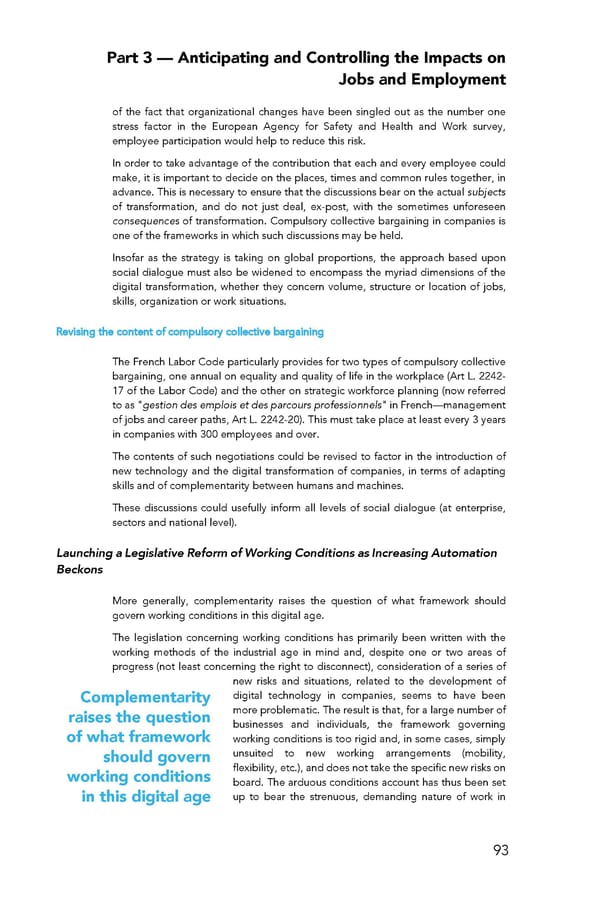Part 3 — Anticipating and Controlling the Impacts on Jobs and Employment of the fact that organizational changes have been singled out as the number one stress factor in the European Agency for Safety and Health and Work survey, employee participation would help to reduce this risk. In order to take advantage of the contribution that each and every employee could make, it is important to decide on the places, times and common rules together, in advance. This is necessary to ensure that the discussions bear on the actual subjects of transformation, and do not just deal, ex-post, with the sometimes unforeseen consequences of transformation. Compulsory collective bargaining in companies is one of the frameworks in which such discussions may be held. Insofar as the strategy is taking on global proportions, the approach based upon social dialogue must also be widened to encompass the myriad dimensions of the digital transformation, whether they concern volume, structure or location of jobs, skills, organization or work situations. Revising the content of compulsory collective bargaining The French Labor Code particularly provides for two types of compulsory collective bargaining, one annual on equality and quality of life in the workplace (Art L. 2242- 17 of the Labor Code) and the other on strategic workforce planning (now referred to as "gestion des emplois et des parcours professionnels" in French—management of jobs and career paths, Art L. 2242-20). This must take place at least every 3 years in companies with 300 employees and over. The contents of such negotiations could be revised to factor in the introduction of new technology and the digital transformation of companies, in terms of adapting skills and of complementarity between humans and machines. These discussions could usefully inform all levels of social dialogue (at enterprise, sectors and national level). Launching a Legislative Reform of Working Conditions as Increasing Automation Beckons More generally, complementarity raises the question of what framework should govern working conditions in this digital age. The legislation concerning working conditions has primarily been written with the working methods of the industrial age in mind and, despite one or two areas of progress (not least concerning the right to disconnect), consideration of a series of new risks and situations, related to the development of Complementarity digital technology in companies, seems to have been raises the question more problematic. The result is that, for a large number of of what framework businesses and individuals, the framework governing working conditions is too rigid and, in some cases, simply should govern unsuited to new working arrangements (mobility, working conditions flexibility, etc.), and does not take the specific new risks on board. The arduous conditions account has thus been set in this digital age up to bear the strenuous, demanding nature of work in 93
 For a Meaningful AI - Report Page 93 Page 95
For a Meaningful AI - Report Page 93 Page 95